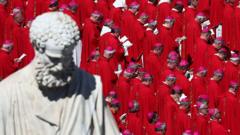In just days, over 130 cardinals will embark on a clandestine journey to select a new pope, ensuring an intensely private process enforced by stringent security measures.
Conclave: The Secrets Behind Selecting the Next Pope

Conclave: The Secrets Behind Selecting the Next Pope
An exclusive look into the rituals and secrecy surrounding the papal election.
This week, 133 cardinals will enter the Sistine Chapel for one of the globe's most enigmatic elections, that of the new pope. This conclave, a ritual steeped in centuries of tradition, requires each cardinal to take a solemn vow to uphold "absolute and perpetual secrecy" regarding the proceedings, impacting not just their actions, but also those of the Vatican staff present.
The conclave will be initiated this Wednesday, and the Vatican's commitment to security is evident. All attendees—medical staff, kitchen workers, and cardinals alike—must forsake their electronic devices to prevent external influence and to maintain confidentiality. Visitors will not be able to disrupt the voting process or undermine the sanctity of this critical decision.
John Allen, editor of the Crux news site, explains that the conclave atmosphere is one of total isolation. The Vatican polices this secrecy rigorously, employing electronic jammers to disable any unauthorized communication. Both Msgr Paolo de Nicolo and Ines San Martin highlight that the only means of communication will be restricted to walkie-talkies for emergencies such as summoning medical help or announcing the election of the new pope.
While many maintain silence, speculation surrounding potential candidates is rampant. The Italian media is rife with rumors and sightings of cardinals trying to gauge potential alliances, showcasing headlines like "The Cardinals' Last Suppers" in reference to their pre-conclave gatherings. At the same time, journalists are on high alert, interviewing locals in hopes of gaining insights into the cardinals' discussions.
The Catholic Church's power stems not merely from its spiritual authority but also from its global socio-political influence. Therefore, the choice of pope is expected to resonate beyond the Vatican walls. Historical practices, such as the involvement of Catholic monarchs in papal selections, have faded, but external voices tirelessly seek to sway the election today. Public figures and reports, like the critiques from Rome's Il Messaggero, provide a backdrop of tension against the already intricate decision-making process.
As the cardinals prepare for their pivotal role, they are ready to set aside the external pressures of media and public opinion. With the conclave fast approaching, the crucial conversations behind closed doors will shape the future of the Catholic Church. The weight of tradition meets modern complexities as the selection process unfolds within the spiritual heart of Catholicism.



















